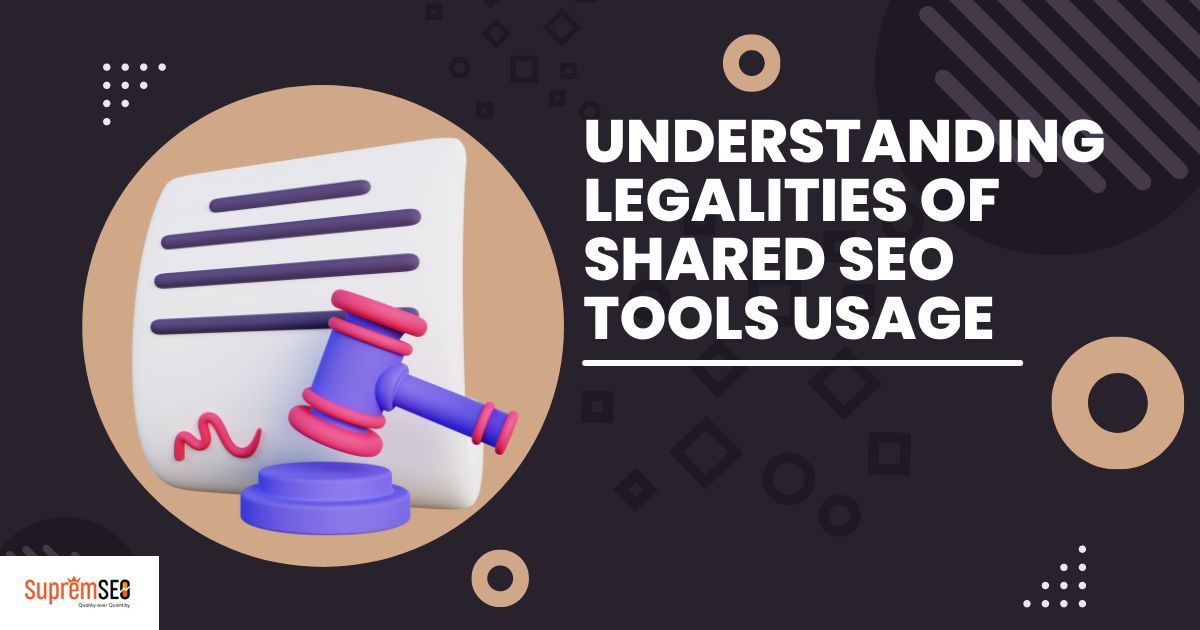When it comes to search engine optimization (SEO), sharing tools is a common practice. These tools can help website owners, marketers, and SEO professionals analyze and optimize their websites for better search engine rankings. However, the legality of sharing SEO tools can be a gray area, and it’s important to understand the legalities of sharing SEO tools to avoid any potential legal issues.

One of the main concerns with shared SEO tools usage is the violation of the terms of service (TOS) of the SEO tools providers. Most SEO tools providers have strict TOS that prohibit sharing accounts or using a single account for multiple users. Violating these TOS can result in the suspension or termination of the account and, in some cases, legal action. Therefore, it’s crucial to read and understand the TOS of each SEO tool before sharing it with others.
Another legal concern with shared SEO tools usage is the potential for copyright infringement. Some SEO tools use proprietary algorithms and data that are protected by copyright law. Sharing these tools without permission from the copyright owner can result in legal action for copyright infringement. Therefore, it’s important to ensure that the SEO tools being shared are not infringing on any copyrights and are being used in compliance with copyright laws.
Legal Foundations of SEO Tool Sharing

When it comes to the legalities of shared SEO tool usage, there are a few key considerations that must be taken into account. In particular, it is important to understand copyright and trademark laws, data protection and privacy regulations, and compliance with SEO tool licenses.
Understanding Copyright and Trademark Laws
Copyright and trademark laws are designed to protect intellectual property and prevent unauthorized use or reproduction of copyrighted or trademarked materials. When it comes to shared SEO tool usage, it is important to ensure that all users are aware of the copyright and trademark laws that apply to the tools they are using. This may involve obtaining permission from the copyright or trademark owner before using the tool or ensuring that the tool is licensed for use by multiple users.
Data Protection and Privacy Regulations
Data protection and privacy regulations are designed to protect personal data and ensure that users are aware of how their data is being used. When it comes to shared SEO tool usage, it is important to ensure that all users are aware of the data protection and privacy regulations that apply to the tools they are using. This may involve obtaining user consent before collecting or using personal data or ensuring that the tool is compliant with the General Data Protection Regulation (GDPR) and other relevant data protection regulations.
Compliance with SEO Tool Licenses
When using shared SEO tools, it is important to ensure that all users are aware of the terms of service, liability policies, and disclaimers that apply to the tool. This may involve reviewing the license agreement and ensuring that all users are aware of their obligations under the agreement. It may also involve ensuring that the tool is used in accordance with the license agreement and that all users are aware of the consequences of non-compliance.
Overall, there are a number of legal considerations that must be taken into account when it comes to shared SEO tool usage. By understanding copyright and trademark laws, data protection and privacy regulations, and compliance with SEO tool licenses, users can ensure that they are using these tools in a legal and responsible manner.
Strategic Implications for SEO

When using shared SEO tools, there are strategic implications that businesses need to consider. Here are some of the key factors to keep in mind:
Impact on Organic Traffic and Rankings
Shared SEO tools can have a significant impact on a website’s organic traffic and rankings. If multiple businesses are using the same tool, there is a risk that they will be optimizing for the same keywords and competing against each other for rankings. This can lead to a dilution of organic traffic and lower rankings for all businesses involved.
Keyword Research and Competition Analysis
Keyword research and competition analysis, often discussed on platforms like Quora and Reddit, are critical components of SEO. Shared SEO tools can provide valuable insights into the keywords that competitors are targeting and the strategies they are using to rank higher. However, businesses need to be careful when using shared tools to ensure that they are not violating any ethical considerations or legal requirements.
Maintaining Trust and Brand Integrity
Maintaining trust and brand integrity is essential for businesses of all sizes. When using shared SEO tools, businesses need to be careful not to compromise their brand integrity or violate any ethical considerations. This includes ensuring that they are not using any black hat SEO techniques or engaging in any other practices that could harm their reputation.
In summary, shared SEO tools can be a valuable resource for businesses looking to improve their organic traffic and rankings. However, businesses need to be careful when using these tools to ensure that they are not violating any ethical considerations or legal requirements. By maintaining trust and brand integrity, businesses can use shared SEO tools to gain a competitive edge and improve their overall online presence.
Technical Aspects of Shared SEO Tool Usage
When using shared SEO tools, a number of technical aspects need to be considered to ensure accurate data and metrics and adaptability to search engine algorithms.
Ensuring Accurate Data and Metrics
One key technical aspect of using shared SEO tools is ensuring that the data and metrics are accurate and reliable. This is particularly important when monitoring search queries, search volume, and other metrics used to track a website’s performance.
To ensure accuracy, it is important to use reliable tools like Moz that have a proven track record of delivering accurate data, allowing users to effectively access the tool for comprehensive SEO analysis. Additionally, it is important to regularly monitor the data being collected to identify any anomalies or discrepancies that could indicate issues with the tool or data collection process.
Adapting to Search Engine Algorithms
Another important technical aspect of using shared SEO tools is adapting to search engine algorithms. Search engines like Google and Bing use complex algorithms to determine how websites are ranked in search results.
To ensure that a website is optimized for these algorithms, it is important to use different tools, such as Ahrefs and SpyFu, each designed to monitor and track changes in search engine algorithms. This can include tools that track Google Trends, as well as tools that monitor how crawlers and bots are interacting with a website.
Overall, using shared SEO tools can be a valuable way to improve a website’s performance in search results. However, it is important to consider the technical aspects of using these tools to ensure accurate data and metrics and adaptability to search engine algorithms.
Best Practices for Shared SEO Tools
Certain best practices regarding shared SEO tools can help ensure that teams are working efficiently and effectively. These practices include developing a collaborative SEO strategy and monitoring and protecting sensitive information.
Developing a Collaborative SEO Strategy
One of the most important best practices for shared SEO tools is to develop a collaborative SEO strategy. This involves working together as a team to identify goals, target audiences, and key performance indicators (KPIs). By doing so, everyone on the team can work towards the same objectives and ensure that their efforts are aligned.
To develop a collaborative SEO strategy, it is important to encourage transparency and accountability. This means that everyone on the team should be aware of what others are working on and be able to provide feedback and suggestions. It also means that everyone should be held accountable for their actions and results.
Monitoring and Protecting Sensitive Information
Another important best practice for shared SEO tools is to monitor and protect sensitive information. This includes data encryption, security measures, and privacy concerns.
To ensure legal compliance, it is important to have a clear understanding of the legalities of shared SEO tools usage. This means that teams should be aware of any regulations or laws that apply to their work and ensure that they are following them.
In addition, it is important to implement security measures to protect sensitive information. These measures include using strong passwords, limiting access to certain tools and data, and monitoring for unauthorized access.
Overall, by following these best practices for shared SEO tools, teams can work together more effectively and ensure that their marketing strategies are aligned and successful.
| Category | Details |
|---|---|
| Key Concerns | – Violation of Terms of Service (TOS)<br>- Copyright infringement |
| Legal Foundations | – Understanding copyright and trademark laws<br>- Data protection and privacy regulations<br>- Compliance with SEO tool licenses |
| Strategic Implications | – Impact on Organic Traffic and Rankings<br>- Keyword Research and Competition Analysis<br>- Maintaining Trust and Brand Integrity |
| Technical Aspects | – Ensuring Accurate Data and Metrics<br>- Adapting to Search Engine Algorithms |
| Best Practices | – Developing a Collaborative SEO Strategy<br>- Monitoring and Protecting Sensitive Information |
| Frequently Asked Questions | – Legality of sharing access to SEO tools<br>- Risks associated with participating in a group buy<br>- How shared SEO tool services operate<br>- Potential consequences of using tools in a shared environment<br>- Can sharing violate the tool providers’ terms of service? |
Frequently Asked Questions
Is it legal to share access to SEO tools with others?
Sharing access to SEO tools with others is not illegal in itself. However, it is important to ensure that the tool provider’s terms of service allow for sharing accounts. To confirm this, contacting their customer support may be necessary. Some providers prohibit sharing accounts and may take legal action against users who violate their terms of service.
What are the risks associated with participating in a group buy for SEO tools?
Participating in a Group Buy SEO tools can be risky. The tools may be pirated or obtained through fraudulent means, which could result in legal action against the user. Additionally, the tools may not be updated regularly or may not work as expected, which could result in wasted time and resources.
How do shared SEO tool services operate?
A group buy service for SEO tools operates by pooling resources from multiple users to purchase and share access to SEO tools. Users pay a fee to join the service and gain access to the shared tools. The service provider is responsible for managing access and ensuring that users comply with the tool providers’ terms of service.
What are the potential consequences of using SEO tools in a shared environment?
Using SEO tools in a shared environment can have several potential consequences. The tools may not work as expected due to conflicts with other users or outdated software. Additionally, using shared tools may expose sensitive data to other users, which could compromise the user’s privacy and security.
Can sharing SEO tools violate the terms of service of the tool providers?
Sharing SEO tools can violate the terms of service of the tool providers if they prohibit the sharing of accounts. Users who violate the terms of service may face legal action or account suspension. It is important to carefully review the terms of service before sharing accounts.
What best practices should be followed when considering the shared use of SEO tools?
When considering the shared use of SEO tools, it is important to ensure that the tool providers allow for account sharing. Additionally, users should only join reputable shared tool services and avoid pirated or fraudulent tools. Users should also be careful not to share sensitive data with other users and keep their accounts secure.










